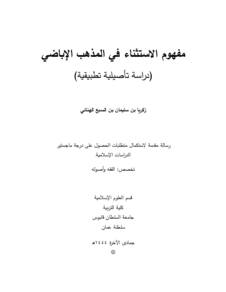وثيقة
مفهوم الاستثناء في المذهب الإباضي : (دراسة تأصيلية تطبيقية).
الناشر
جامعة السلطان قابوس.
ميلادي
2023
اللغة
العربية
الموضوع
الملخص الإنجليزي
Textual evidences in Islam were and are the focus area of jurisprudent
scholars as they obey Allah orders by extracting the islamic rulings from those
evidences in order to worship Allah in the most evidence-based way. While the
literal textual evidences lead to different rulings, the interpretation of those
evidences leads to either an agreement or a disagreement. Therefore this research
focuses on one type of disagreement concepts which's the concept of exception
among Ibadi scholars. This research discusses the concept from two
perspectives. First, the origin of this concept in Ibadi literature and their
understanding of it. Second, the application of the concept by extracting the
branches that this concept is applied on and the branches that this concept is not
applied on or controversial with other schools.
The research aims to answer two main questions. First, how Ibadi scholars
extracted the concept and how it was originated? Second, did Ibadus apply the
concept in jurisprudence branches as same as it was supposed to applied when
it was originated initially? And if there is a misapplication identified, what is the
reason behind it?
The researcher followed an inductive and analytical methodologies in order
to come up with a result that matches the origination and the application of the
concept among Ibadi scholars. The results of this research are as follow:
1- Ibadi scholars did not clearly identified the concept as a sole identified
concept. It is safe to say that they define it generally as: the overruling of general
ruling in the excepted entities.
2- Ibadi scholars appreciate that the concept can be abrogated with its origin,
or without its origin but the origin cannot be abrogated without the concept. They
also only identified that the concept itself can abrogate a ruling if the abrogated
ruling is not a definite essential ruling by certainty and meaning.
3- Ibadi scholars applied the concept in their jurisprudence in the same way
as they extracted and originated it. The applied the concept according at the same
level of certainty of the discussed evidence, so the resulted ruling was in the
same in the level of strength in use as the evidence that it was applied on. Ibadi
scholars did not apply the concept when its conditional terms were not met nor
when there was a stronger concept used in the case.
المجموعة
URL المصدر
الملخص العربي
كانت الادلة النصية وما زالت محل نظر الفقهاء لاستجلاء الاحكام الشرعية امتثالاً لأمر الله تعالى، ورغبة في عبادته على أوضح سبيل وأبين طريق، ولئن كان منطوق الادلة يوصل إلى أحكام كثيرة فإن مفهومه الموافق والمخالف كذلك عند طائفة كبيرة من أهل العلم، لذلك جاء هذا البحث ليقف على نوع من أنواع مفهوم المخالفة وهو مفهوم الاستثناء عند ، وذلك بجمع ما أ َّصل له علماء الاباضية في هذا المفهوم الاباضية من جهتين: تأصيليةٍ ووذلك بجمع ما أصللا له علماءالإباضية في هذا المفهوم وتحليله وتطبيقه، بالبحث في كتبهم الفقهية واستخراج الفروع التي أُصل للعمل فيها بهذا المفهوم، أو أُصل لها بخلاف ذلك خلافا لغيرهم.
من هنا كان الباحث يستقصي إجابة سؤالين هما: كيف أصل الاباضية للعمل بمفهوم الاستثناء؟ وهل وافق الاباضية في تفريعاتهم الفقهية ما أصلوا له، فإن كان ثمة مباينة فما سببها؟.
من هنا كان الباحث يستقصي إجابة سؤالين هما: كيف أصل الاباضية للعمل بمفهوم الاستثناء؟ وهل وافق الاباضية في تفريعاتهم الفقهية ما أصلوا له، فإن كان ثمة مباينة فما سببها؟.
قالب العنصر
الرسائل والأطروحات الجامعية

